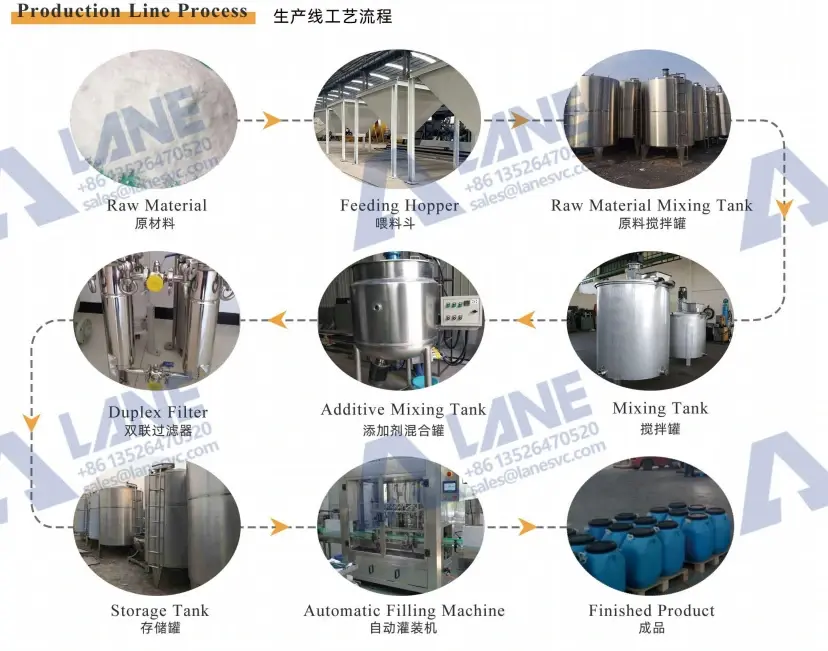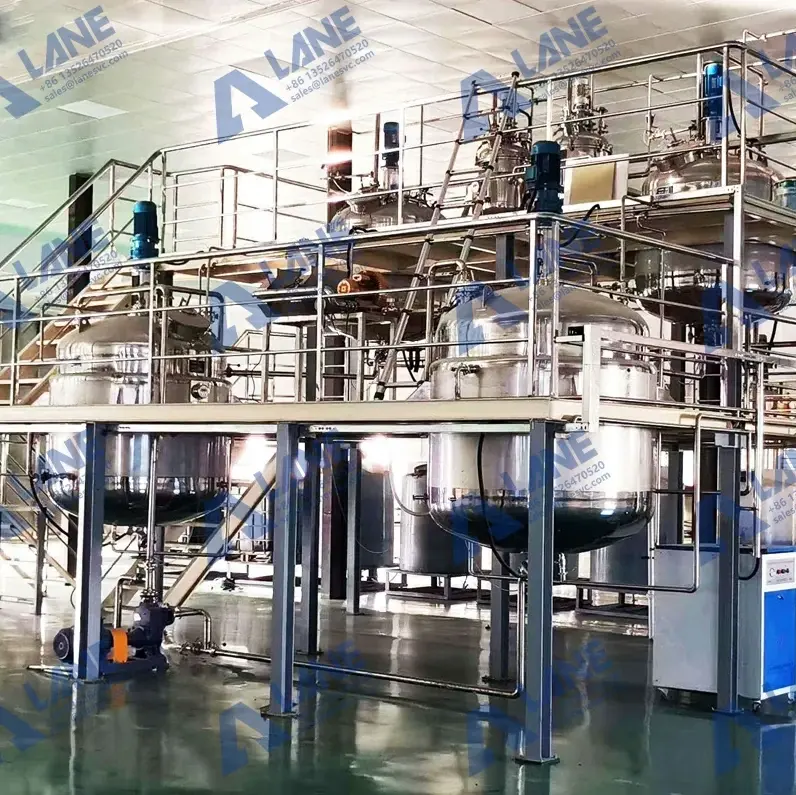Liquid Fertilizer Production Line for Farmland Irrigation: Efficient Solutions for Modern Agriculture
- Efat Elahi
- Sep 29, 2025
- 5 min read
The liquid fertilizer production line for farmland irrigation has become a transformative solution for modern agriculture, offering farmers a reliable way to improve crop yields, enhance soil fertility, and optimize irrigation efficiency. As global demand for sustainable farming increases, deploying a high-quality liquid fertilizer production system ensures that nutrients are delivered directly to crops, reducing waste and promoting healthier growth. Companies like LANE have leveraged decades of expertise to design production lines that are not only efficient but also customizable to meet diverse farming needs.

Understanding the Liquid Fertilizer Production Line
A liquid fertilizer production line for farmland irrigation refers to a comprehensive system that converts organic or inorganic raw materials into a nutrient-rich liquid fertilizer suitable for direct irrigation. Unlike traditional solid fertilizers, liquid fertilizers can be applied with irrigation systems, ensuring uniform nutrient distribution, minimizing soil compaction, and supporting precise nutrient management.
Key Components of the Production Line
Raw Material Processing Equipment
Raw materials such as organic waste, animal manure, plant residues, and mineral nutrients are first processed to remove impurities and achieve a consistent texture. LANE provides high-efficiency shredders and mixers that reduce particle size and improve solubility, ensuring smooth downstream production.
Fermentation Tanks
Organic matter undergoes controlled fermentation to break down complex molecules into plant-available nutrients. LANE’s vertical fermentation tanks come with advanced temperature and aeration controls, promoting rapid microbial activity and higher nutrient content.
Liquid Mixing and Homogenization
After fermentation, ingredients are blended into a uniform liquid fertilizer. Precision stainless steel mixing tanks ensure a consistent concentration, critical for drip irrigation or fertigation systems.
Filtration and Clarification Units
Dual filter removes solids and unwanted residues to prevent clogging irrigation systems. LANE’s liquid fertilizer production lines feature robust filtration modules that are easy to clean and maintain.
Storage and Packaging
The final liquid fertilizer is stored in stainless steel storage tank designed to preserve nutrient integrity. LANE also provides automated bottling and bulk packaging solutions, streamlining logistics for large-scale farms.

Advantages of Using Liquid Fertilizer in Farmland Irrigation
Liquid fertilizers offer several advantages over conventional solid fertilizers, making them an ideal choice for modern agriculture.
Enhanced Nutrient Uptake
By delivering nutrients in a soluble form directly to the roots or leaves, crops can absorb them more efficiently. This leads to faster growth, higher yields, and improved crop quality.
Precision Application
Liquid fertilizers allow farmers to tailor nutrient concentrations based on soil tests and crop requirements. This precision reduces wastage and prevents over-fertilization, supporting sustainable farming practices.
Compatibility with Modern Irrigation Systems
The liquid fertilizer production line for farmland irrigation is designed for integration with drip, sprinkler, and center-pivot irrigation systems. This compatibility ensures that nutrients are evenly distributed across the field.
Reduced Labor and Time
Liquid fertilizer application is faster and requires less labor than spreading solid fertilizers. Combined with LANE’s automated production line, farms can achieve efficient nutrient management with minimal effort.
LANE’s Innovative Solutions for Liquid Fertilizer Production
With over 15 years of experience in fertilizer machinery, LANE offers tailored liquid fertilizer production lines for farmland irrigation. Here are some highlights:
Energy-Efficient Design
LANE’s production lines optimize energy use without compromising output. From high-efficiency pumps to smart mixing systems, the equipment reduces operational costs while maintaining consistent production quality.
Modular and Customizable Layout
Every farm has unique requirements. LANE’s modular systems allow clients to scale production capacity, integrate additional fermentation tanks, or upgrade filtration units according to evolving needs.
High Durability and Low Maintenance
Using premium stainless steel and corrosion-resistant materials, LANE ensures long-lasting equipment with minimal maintenance requirements. This reliability translates into fewer production interruptions and a higher return on investment.
Comprehensive After-Sales Support
LANE not only provides equipment but also offers technical support, installation guidance, and staff training. This ensures smooth commissioning and ongoing operation, which is crucial for large-scale agricultural projects.
Production Process of Liquid Fertilizer for Farmland Irrigation
The production of liquid fertilizer involves several stages, each critical for achieving optimal nutrient content and solubility.
Step 1 – Raw Material Collection and Preprocessing
Organic wastes such as crop residues, fruit and vegetable by-products, and animal manure are collected and mechanically shredded. This step increases surface area, enhancing fermentation efficiency.
LANE equipment advantage: High-capacity shredders reduce processing time while maintaining uniform particle size.
Step 2 – Fermentation and Nutrient Activation
Processed materials are loaded into fermentation tanks. Controlled aeration, temperature, and moisture conditions accelerate decomposition. Microorganisms convert complex organic matter into simple nutrients like nitrogen, phosphorus, and potassium.
LANE advantage: Automated monitoring systems provide real-time data on pH, temperature, and oxygen levels, maximizing microbial activity.
Step 3 – Liquid Extraction and Mixing
Post-fermentation, the material is mixed with water or other nutrient solutions to form a liquid fertilizer. Homogenization ensures consistent nutrient density for effective irrigation application.
Step 4 – Filtration and Clarification
Solids are removed to prevent clogging irrigation equipment. LANE’s filtration units are designed for continuous operation, allowing uninterrupted production.
Step 5 – Storage and Packaging
The clarified liquid fertilizer is stored in corrosion-resistant tanks or packaged for direct sale. Optional automation includes filling machines and sealing systems, ready for distribution or farm use.
Case Study: High-Yield Farmland Irrigation with Liquid Fertilizer
A 500-hectare vegetable farm in Indonesia upgraded to a LANE liquid fertilizer production line for farmland irrigation. Within six months:
Crop yields increased by 20%
Fertilizer application costs reduced by 15%
Soil quality improved due to balanced nutrient delivery
This case demonstrates the practical benefits of integrating a liquid fertilizer production system with modern irrigation infrastructure.

FAQ: Liquid Fertilizer Production Line for Farmland Irrigation
Q1: Can the production line use both organic and inorganic raw materials?A1: Yes, LANE’s systems are versatile and can process a range of organic wastes and mineral nutrients.
Q2: How is the liquid fertilizer applied to crops?A2: It can be applied via drip, sprinkler, or center-pivot irrigation systems, ensuring precise nutrient delivery.
Q3: What is the typical production capacity?A3: LANE offers lines ranging from 5 tons/day to over 100 tons/day, depending on farm size and requirements.
Q4: Is the system energy-efficient?A4: Absolutely. LANE’s equipment is designed to minimize power consumption while maintaining high productivity.
Q5: How long does it take from raw material to final liquid fertilizer?A5: Depending on fermentation time and material type, the process typically takes 7–14 days for organic fertilizers.
Future Trends in Liquid Fertilizer Production
As agriculture evolves, the demand for efficient liquid fertilizer production lines for farmland irrigation will grow. Trends include:
Smart Fertilization: IoT-enabled sensors for real-time nutrient monitoring and automated application.
Sustainable Inputs: Increased use of agricultural waste and renewable materials as raw inputs.
Customization: Precision nutrient formulations tailored to specific crops and soil types.
Integration with Renewable Energy: Solar-powered pumps and mixers to reduce carbon footprint.
Investing in a liquid fertilizer production line for farmland irrigation is no longer just a choice—it’s a necessity for modern, efficient, and sustainable farming. By adopting LANE’s advanced solutions, farms can achieve higher yields, optimize nutrient management, and reduce operational costs. With reliable equipment, modular designs, and comprehensive after-sales support, LANE empowers farmers worldwide to embrace precision agriculture and make the most of their farmland resources.
Email: sales@lanesvc.com
Contact number: +86 13526470520
Whatsapp: +86 13526470520






Comments